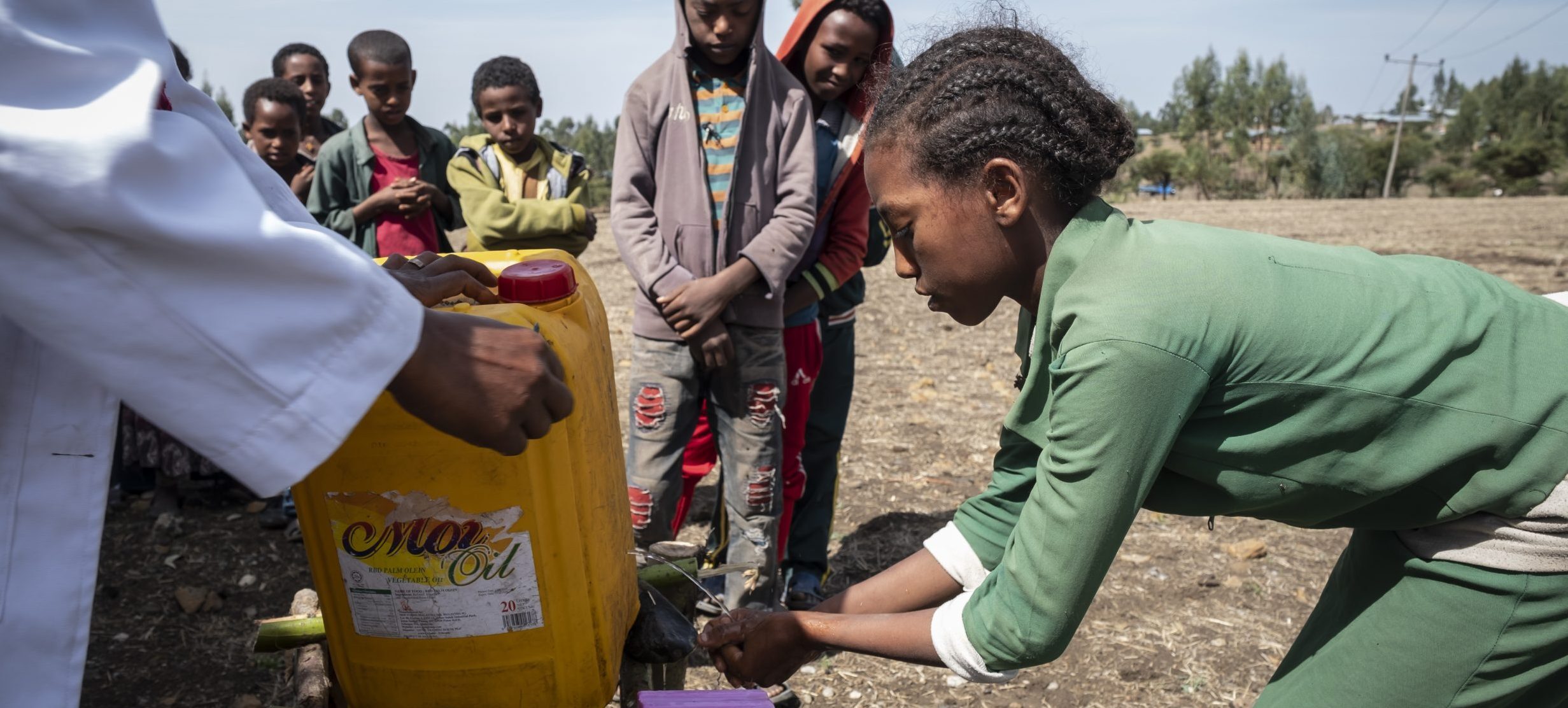
Wash your hands!
Nearly half of the people in rural Ethiopia lack clean water for drinking and for bodily hygiene. What they laboriously draw from ponds, streams and rivers is contaminated with bacteria and parasites – life-threatening illnesses are the result. Together with the population we are therefore building hand dug wells and spring developments in central places, or whole water supply systems. We also organise awareness-raising campaigns and alongside the construction of schools build latrines and hand-washing stations. So even the smallest learn how important hygiene and cleanliness is.
A thin stream of water shoots from the little hole in the side of the plastic canister as Meaza Debalke pulls out the stopper – a nail. Quickly eleven-year-old Tiruwerk Yegu holds her hands under the stream and picks up the soap. “Spread it thoroughly over the palms of your hands, then between the fingers, and on the back of your hands,” explains Meaza. She is a biology teacher at the Debat Higher Primary School. Nearly a dozen students from various levels have come together for her hygiene training. “First the hands, then the face. Otherwise you’re encouraging bacteria and viruses to get directly into the mouth, the nose and the eyes.”
Water still drips from Tiruwerk’s chin as she steps aside to make room for the next child. Earlier the year five student used to often go unwashed to lessons. “I didn’t know that could make me ill.” Yet Tiruwerk has learned a lot since her first training session a few years ago. “Now I always wash my hands and face before I go to school.”
Meaza is proud when she hears something like that. The 28-year-old is one of two teachers who look after hygiene education. She has been teaching for three years at the school which Menschen für Menschen built for over nine hundred year one to year eight students at the edge of Mekane Selam in the Borena project area. Besides the school buildings with the large, light classrooms the charity has had two latrines constructed.
There is no comparison with the latrines from before. “They were absolutely yucky,” remembers Tiruwerk, and wrinkles her freckle-sprinkled nose. There was also a lack of running water. “We often had to bring canisters from home.” Today the school draws clean water from a well, which the charity has built nearby.
Every Friday Tiruwerk and her fellow students spend two hours sweeping the classrooms and picking up litter from the playground. Menschen für Menschen supplies them with brooms and litter bins. “Earlier a cleaning day like this would hardly have made sense, because with floors and walls made of clay everything immediately became dusty again,” says the 54-year-old headteacher Abebe Ayalew. “Today we really don’t have to remind the students anymore – they get started on their own.”

Part of the school’s approach to hygiene is that during the morning address a check is made as to whether the students have come to lessons washed and with clean clothes. Lined up in rows class by class, the girls and boys stand on the playground. “Most of you have clean faces. That pleases me very much!” calls Meaza. So that everyone can see her, she has climbed up on a stone in her white teacher’s jacket. “Please keep thinking about it. That way we all stay healthy.”
It is essential that the teacher repeats the hygiene tips constantly, as that is the only way they become a matter of course for the students. “For many it is difficult to put into practice at home the rituals which we have with hand washing here at school,” explains Meaza. Apart from that there is often a lack of parental encouragement for hand washing, or simply of clean water or soap. Meaza therefore sometimes invites a family for a discussion or visits them at home. Here she can get a picture of their living situation, and she tries to convince the parents how important it is to take care of their own hygiene, and the bodily hygiene of their children. “It’s best when the students pass on to their family what they learn in our training.”
So with Tiruwerk. “My parents and siblings are happy when I show them what you’ve got to look out for,” she says, with a pleased smile. She wants to become a doctor later, and help people in rural areas to stay healthy. She now knows how important clean water, hand washing and personal hygiene is.